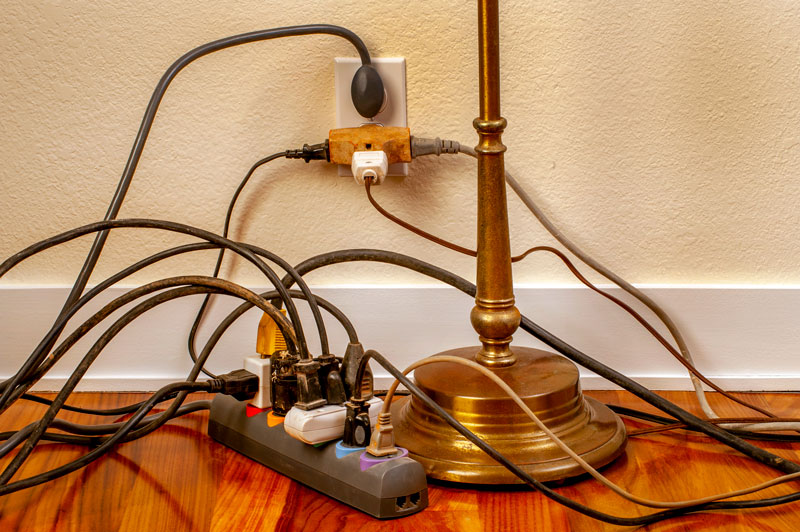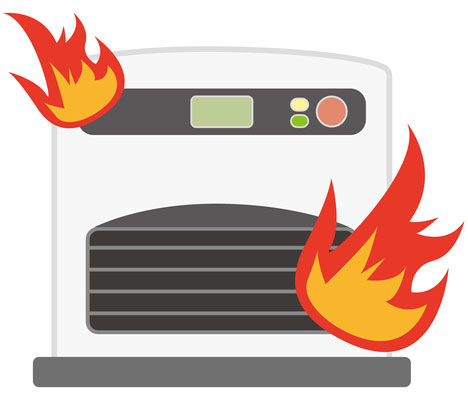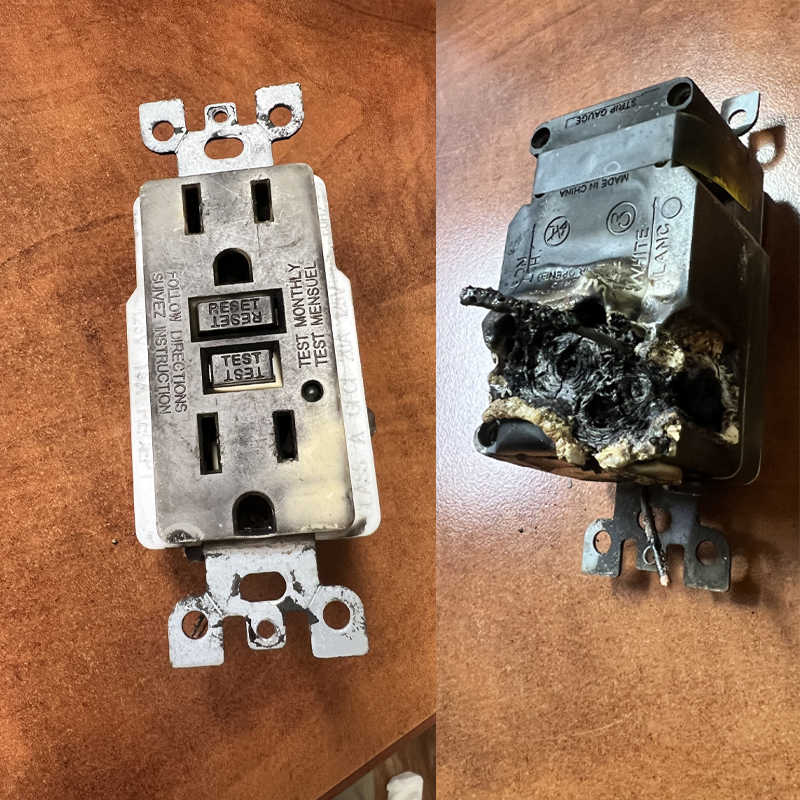Electrical Safety Tips Every Homeowner Needs to Know
Electrical safety is arguably common sense. However, as the saying goes, common sense isn’t so common.
In this article we’ll walk you through several easy ways to avoid electrical hazards in your home. We’re not here to tell you that electrical danger is lurking behind every corner or engage in any sort of fear mongering – just to give you practical everyday advice!
Before we begin, one element of electrical safety that many homeowners don’t realize is necessary is getting regular electrical inspections. An inspection by a licensed electrician ensures that your home’s electrical system is still working properly to keep you and your family safe.
What is Electrical Safety?
People seem to think that the primary danger of electricity is electric shock. And, while it is true that electricity can cause painful, and even occasionally life-threatening injuries, our household electrical systems are usually quite safe.
The main risk for homeowners when it comes to electrical safety is fire. FEMA estimated that in 2021 electricity was responsible for nearly 25,000 residential fires, resulting in over a billion dollars in damages, 295 deaths, and nearly 1000 injuries.
In general, avoiding electrical fires is as simple as getting your home’s electrical system inspected regularly (every 10 years for newer homes, or 5 years for older homes), and following our twelve safety tips:
12 Simple Steps for a Safer Home
Avoid overloading outlets
The flow of electricity generates heat, and the more electricity that flows, the greater this heat becomes. Electrical outlets are rated for a given amount of electrical current – typically 15 amps – and exceeding that can create dangerous conditions which could lead to a fire. If your circuit breaker is working correctly it should shut off the power before the heat becomes too great – but if a fuse doesn’t blow, you could be in for a very bad day.
But how much power draw is too much?
Let’s do some quick math since we normally measure power usage in watts instead of amps.
- Amps x Volts = Watts
- 15 amps (outlet capacity) x 120 volts ( household voltage) = 1800 watts
Hair dryers, space heaters, toaster ovens, and other appliances that generate heat can draw up to that 1800 watt limit, leaving little or no room for other appliances. To prevent overloaded outlets, avoid plugging in multiple high-power draw electrical appliances and instead spread the load between multiple outlets, ideally on different circuits.
Follow appliance instructions
Appliances all have their own specific usage instructions and in order to stay safe, they need to be followed. For the most part, home appliances are pretty easy – but take particular care with appliances that create heat. Their heating elements draw lots of power, pose an electrocution risk around water, and can be a fire hazard when used incorrectly.
Use extension cords sparingly
They say there is nothing more permanent than a temporary solution that works – and extension cords often are used exactly like this! However, extension cords are only designed for temporary use and are a major fire risk when used long-term or used improperly.
- Extension cords are rated for a maximum amperage. Do not exceed this limit or the wire will begin overheating.
- Avoid running extension cords within walls or underneath rugs and carpets, as this can cause the wires to overheat.
- Take care around water, as extension cords can easily turn wet floors into electrified puddles.
Replace damaged electrical cords
This should go without saying – but if you can see the inner conductor of an electrical cord, or the cord has begun to fray, it is time to replace the cord! In general, power cord replacements are fairly easy and do not require replacing the entire appliance.
Install electrical cords neatly
While we’ve all been guilty of having a tangled rats nest of cables behind our computer or TV, it is a good idea to keep these cables tidy! These tangles make it hard to spot dangerous situations like plugs working loose from outlets.
Additionally, electrical cords should be positioned in such a way that they do not pose a tripping hazard, and are safe from curious children or pets who might be interested in unplugging or chewing them!

Unplug appliances when not in use
This isn’t a hard and fast rule – but it’s a good idea to leave appliances unplugged when they aren’t being used. If an appliance is fully unplugged you know for certain that it will not short circuit and create a problem!
When unplugging cords, pull by the plug, not the cord itself. Pulling by the cord can cause the wire’s sheathe to separate, exposing you to live conductors.
If you have outlets that are inaccessible, you can consider connecting your appliances to a power strip and using its power switch to control your appliances. If your family includes children, it is a good idea to place outlet covers on any unused outlets.
Keep electrical devices away from water
Common sense alert! Electricity and water don’t mix! While your newest cell-phone might be water resistant, your hair dryer, laptop charger, and lamps should all be kept dry!
This is an easy, and important, lesson to teach to your children.
Similarly – if you have wet hands stay away from sources of electricity and dry your hands before plugging in appliances.
Allow proper air circulation for your appliances
Resist the temptation to put electrical devices in enclosed spaces with no ventilation. All electrical equipment generates heat, and normally this simply wafts away without causing a problem. However, in a small space this heat can build up, damaging the device or even causing a fire.
Prevent portable heater accidents
Space heaters are very convenient but can pose major risks if used incorrectly.
- Never operate heaters near curtains, upholstered furniture, or any other flammable surface.
- Only use space heaters on stable, level surfaces.
- Space heaters should be plugged directly into the wall receptacle – do not use an extension cord.

Make sure fixtures and appliances are the right wattage
This is less of a problem than in years past, but be sure to match your bulb’s wattage to your fixture’s maximum rating. Putting a 100 watt incandescent bulb in a fixture designed for a 10 watt LED bulb will quickly cause it to overheat.
Regularly test smoke alarms
Smoke alarms should be tested monthly. While it may be an annoying process, these are life saving devices! Additionally, replace smoke alarms every 10 years as their sensors will become less effective with age.
Upgrade to GFCI outlets
Ground fault circuit interrupters, or GFCI, outlets have been used in American homes since the mid 1970s, but their usage has only slowly been phased in over this time. For example, it wasn’t until 2014 that the National Electrical Code required GFCI outlets on dishwasher receptacles.
These outlets protect against electrical shock in wet environments, and that is why we normally see them in kitchens, bathrooms, and utility rooms. Retrofitting GFCI protection on any outlet near water sources is a great way to safeguard your family against electrical shock.

Staying Safe Around Electricity
It would be lovely if electrical safety was purely common sense and intuitive to everyone. However, based on the number of electrical fires that happen every year, this is probably not the case. The tips mentioned above don’t cover every single electrical risk you might encounter in life, but will go a long way towards keeping you and your family safe.
Remember, it is important to have a qualified electrician inspect your home’s electrical system on a regular basis. This will ensure that the built in safety systems, like GFCI protection, are still operating correctly, as well as identifying any potential electrical issues before they can become a real problem!
